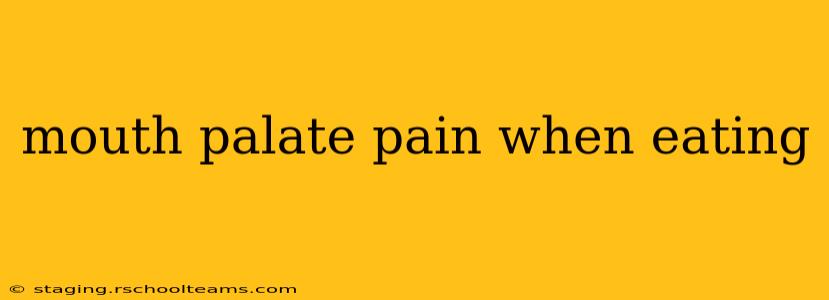Experiencing pain in your mouth or palate when eating can be incredibly frustrating and disruptive. This discomfort can range from a mild ache to a sharp, stabbing sensation, making even simple meals a challenge. Understanding the underlying causes is the first step towards finding relief. This comprehensive guide explores the various reasons why you might experience mouth and palate pain during eating, offering insights into diagnosis and effective treatment options.
What Causes Mouth and Palate Pain When Eating?
Numerous factors can contribute to pain in your mouth and palate while eating. Let's delve into some of the most common culprits:
1. Oral Thrush (Candidiasis): This fungal infection, caused by an overgrowth of Candida yeast, can manifest as white patches on the tongue, palate, and inner cheeks, often accompanied by burning or stinging sensations, especially while eating. Certain medications, weakened immune systems, and poorly controlled diabetes can increase the risk of oral thrush.
2. Geographic Tongue (Benign Migratory Glossitis): This harmless condition is characterized by smooth, red patches on the tongue that change in size and location over time. While usually painless, eating acidic or spicy foods can trigger discomfort.
3. Burning Mouth Syndrome (BMS): This chronic condition causes a burning sensation in the mouth, often affecting the tongue, palate, and lips. The exact cause is unknown, but it's often linked to hormonal changes, nutritional deficiencies, or nerve damage. Eating can exacerbate the burning feeling.
4. Oral Lichen Planus (OLP): This chronic inflammatory condition can affect the mucous membranes of the mouth, causing white or lacy lesions, often accompanied by burning or pain, particularly when consuming certain foods.
5. Allergies: Food allergies can trigger an inflammatory response in the mouth, leading to swelling, itching, and pain. Reactions can range from mild discomfort to severe anaphylaxis.
6. Trauma: Injuries to the mouth, such as burns from hot food or cuts from sharp objects, can cause localized pain and sensitivity when eating.
7. Canker Sores (Aphthous Ulcers): These small, painful ulcers commonly appear on the tongue, gums, and inner cheeks. Eating acidic, spicy, or hot foods can intensify the pain.
8. Cold Sores (Herpes Simplex Virus): Cold sores, caused by the herpes simplex virus, can cause painful blisters around the mouth, making eating difficult.
9. Dental Problems: Issues like cavities, gum disease (gingivitis or periodontitis), ill-fitting dentures, or impacted wisdom teeth can cause pain that radiates to the palate when eating.
10. Medication Side Effects: Some medications can have oral side effects, leading to mouth dryness, irritation, or pain.
How is Mouth and Palate Pain Diagnosed?
A thorough diagnosis begins with a detailed medical history and a physical examination of the mouth and palate. Your dentist or doctor may:
- Visually inspect your mouth: Checking for lesions, swelling, redness, or other abnormalities.
- Perform a swab test: To identify fungal infections (like oral thrush).
- Take a biopsy: In some cases, a small tissue sample may be taken for laboratory analysis to rule out more serious conditions.
- Order blood tests: To check for underlying medical conditions such as diabetes or nutritional deficiencies.
What are the Treatment Options for Mouth and Palate Pain?
Treatment depends on the underlying cause. Options may include:
- Antifungal medications: For oral thrush.
- Topical corticosteroids: To reduce inflammation in conditions like OLP.
- Pain relievers: Over-the-counter pain relievers like ibuprofen or acetaminophen can help manage discomfort.
- Mouth rinses: Antiseptic or analgesic mouthwashes can soothe irritated tissues.
- Dietary changes: Avoiding acidic, spicy, or hot foods can help reduce pain.
- Dental treatment: Addressing dental problems like cavities or ill-fitting dentures.
How Long Does Mouth and Palate Pain Last?
The duration of mouth and palate pain varies significantly depending on the cause. Minor irritations may resolve within a few days, while chronic conditions like BMS may require ongoing management.
When Should I See a Doctor?
If your mouth and palate pain is severe, persistent, or accompanied by other symptoms like fever, swelling, or difficulty swallowing, it's crucial to seek medical attention immediately.
Can Mouthwashes Help with Mouth and Palate Pain?
Many mouthwashes can provide temporary relief from mouth and palate pain, but they don't treat the underlying cause. Choose a mouthwash that's appropriate for your specific condition, and always follow the directions on the label.
What Home Remedies Can Help Soothe Mouth and Palate Pain?
Some home remedies, such as rinsing your mouth with warm salt water or applying a cold compress, can provide temporary relief from mild mouth and palate pain. However, these are not substitutes for professional medical advice and treatment.
This information is for general knowledge and does not constitute medical advice. Always consult with a healthcare professional for diagnosis and treatment of any medical condition.
